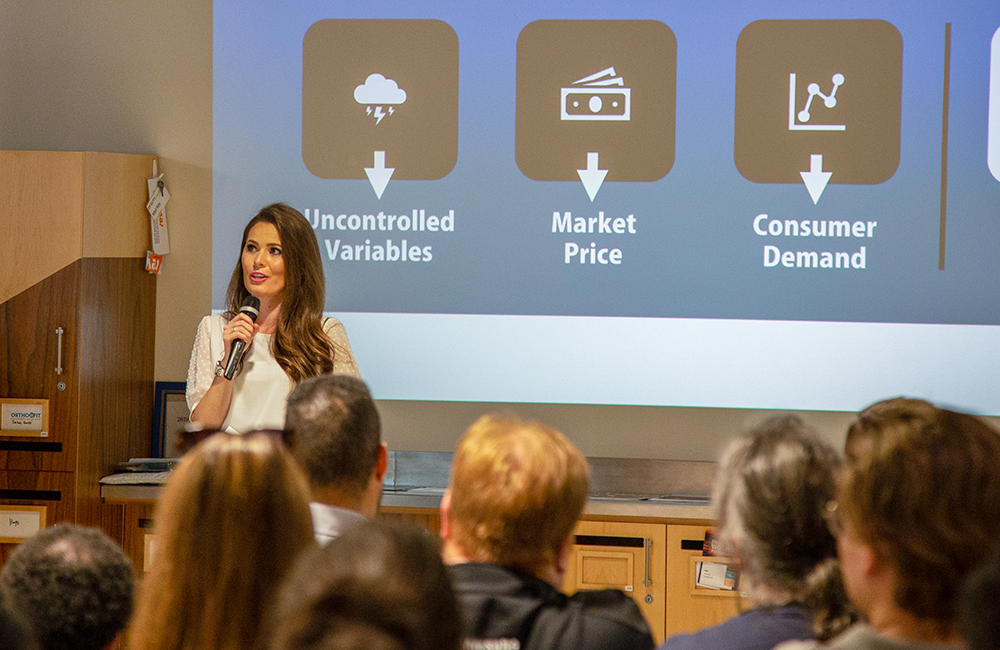
Prototyping Teams Present Their Progress at Demo Day
Earlier this month, a special edition of Networking@Rev celebrated the progress of teams in this summer’s Prototyping Hardware Accelerator cohorts. At Demo Day, participants in the program’s Classic, ClimateTech, and new AgTech tracks pitched their business ideas and demonstrated their prototypes to the entrepreneurial community, including potential investors and mentors.
Launched in 2014 with support from the Cornell University College of Engineering, the Prototyping Hardware Accelerator program helps participants determine if their ideas are commercially desirable, technologically viable, and economically feasible. Three sprints — feasibility, proof of concept, and prototype and pitch — help teams fine-tune their products over the course of the summer program.
Teams in each track enjoy access to a prototyping lab space stocked with state-of-the-art equipment and materials, entrepreneurship training, workshops, one-on-one mentoring, and pitch training. By Demo Day, each team had a working prototype and a pitch deck to share with the public.
Presentations began with an introduction from Dave Putnam, Associate Dean for Innovation and Entrepreneurship at Cornell Engineering. Putnam spoke about the value of testing out business ideas through the Prototyping Hardware Accelerator.
“Hardware is hard — it’s not an easy thing to do,” he said. “You can’t put a design in a customer’s hand. You have to play around with it and see if it works.”
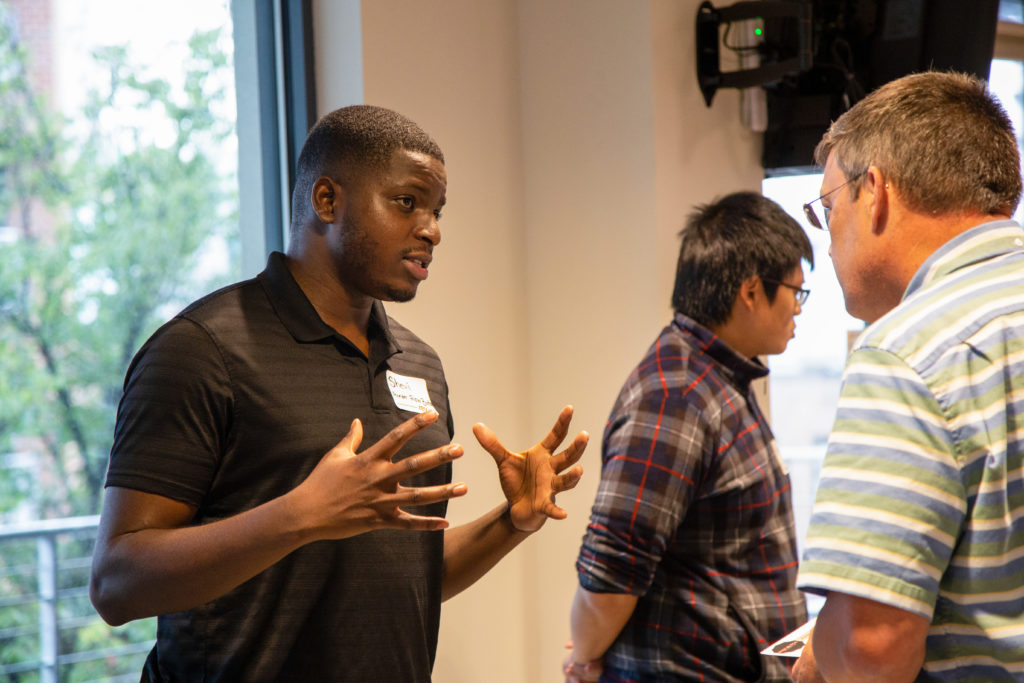
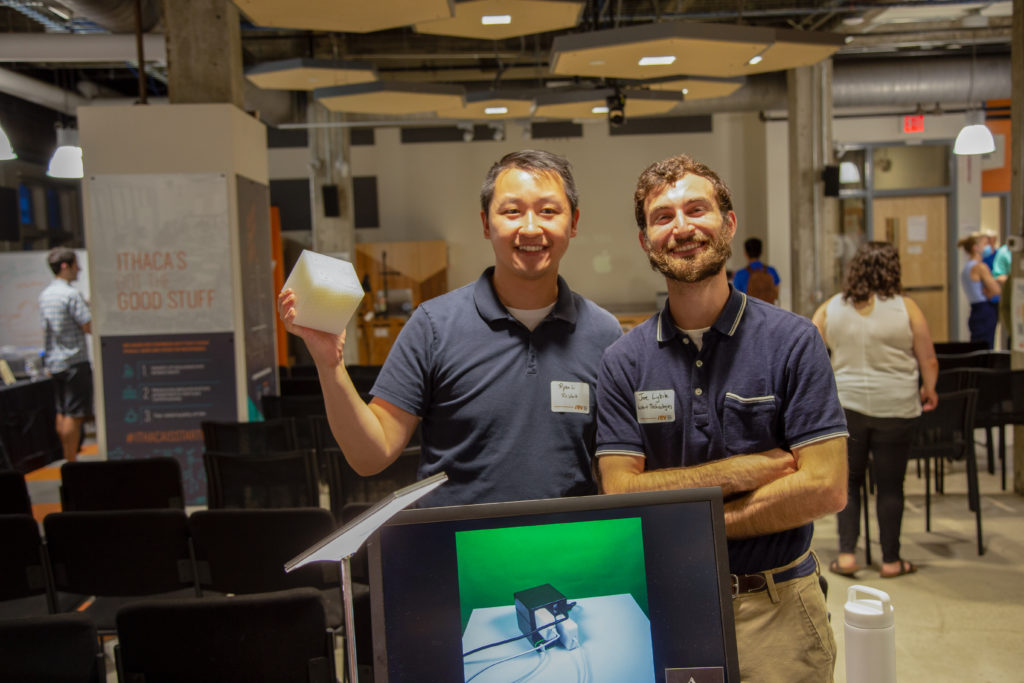
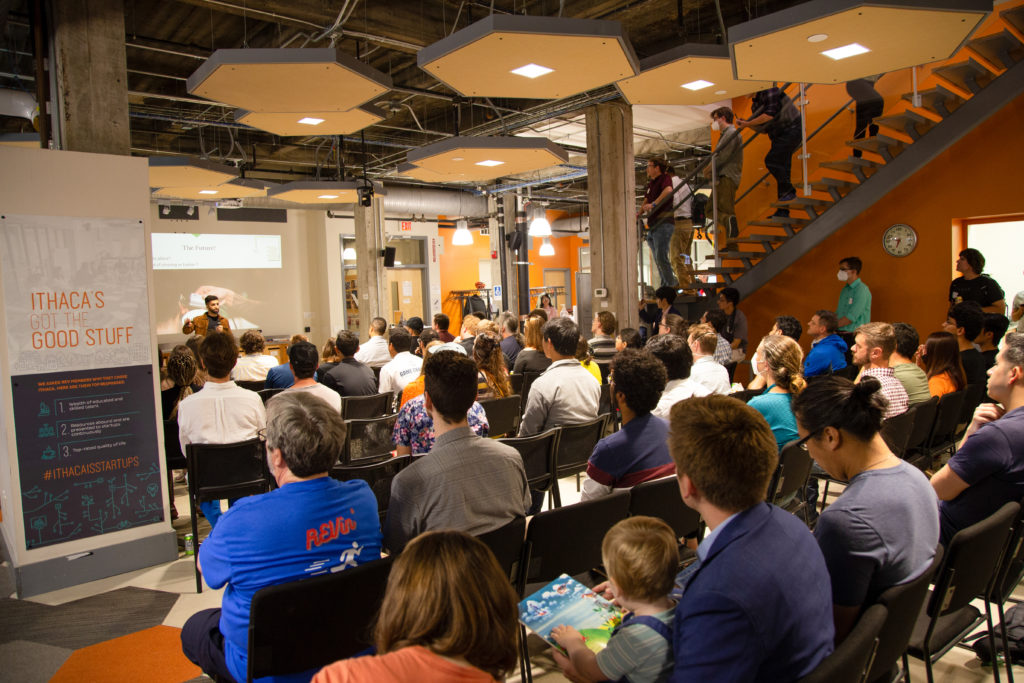
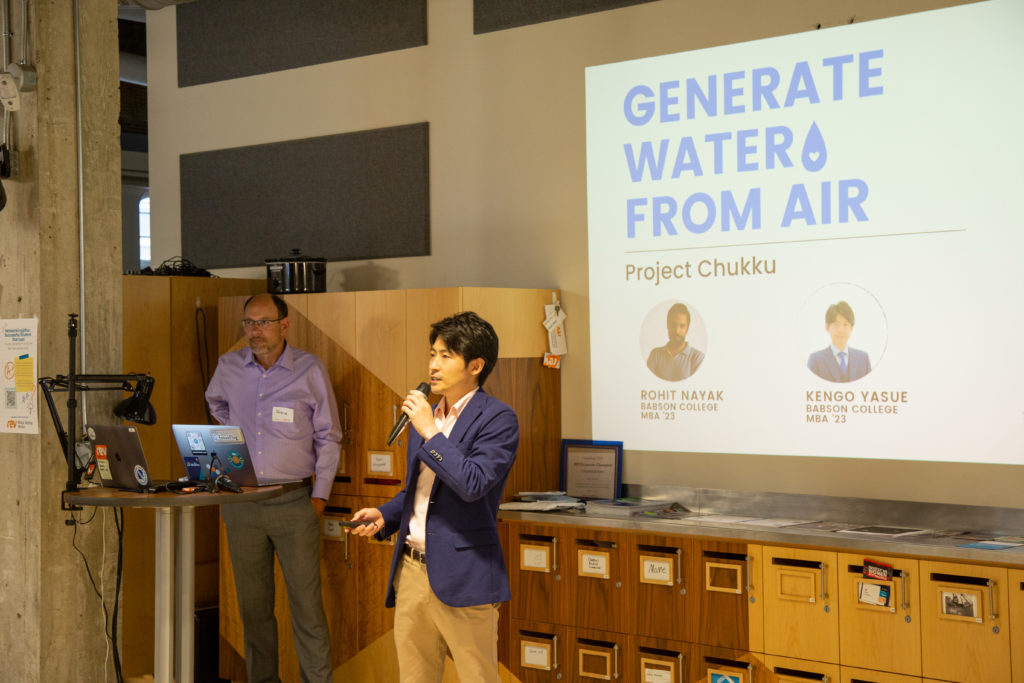
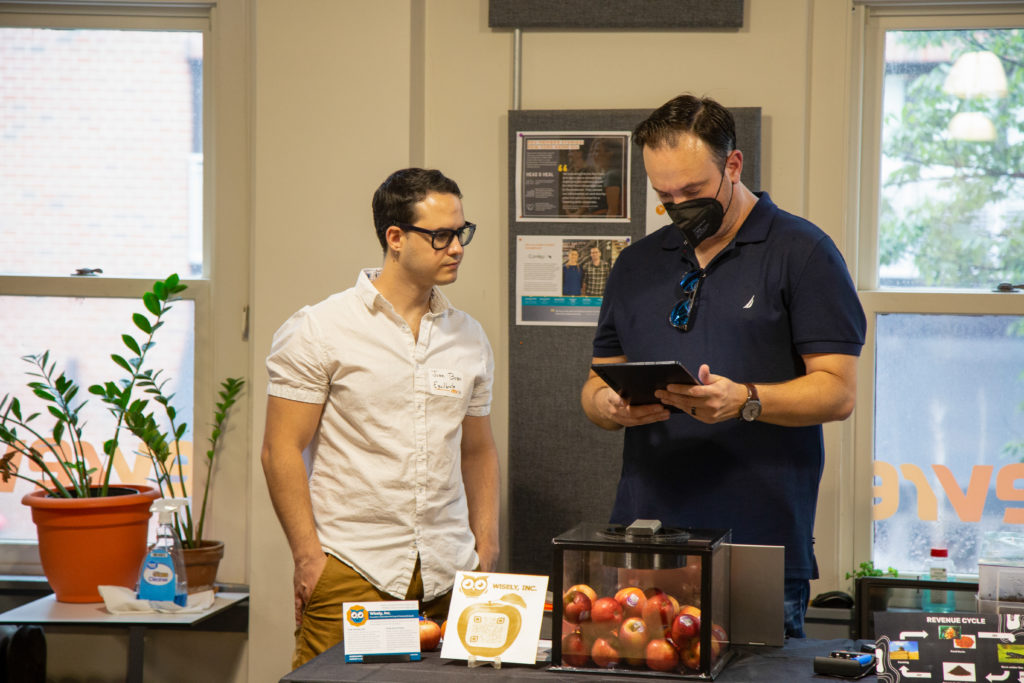
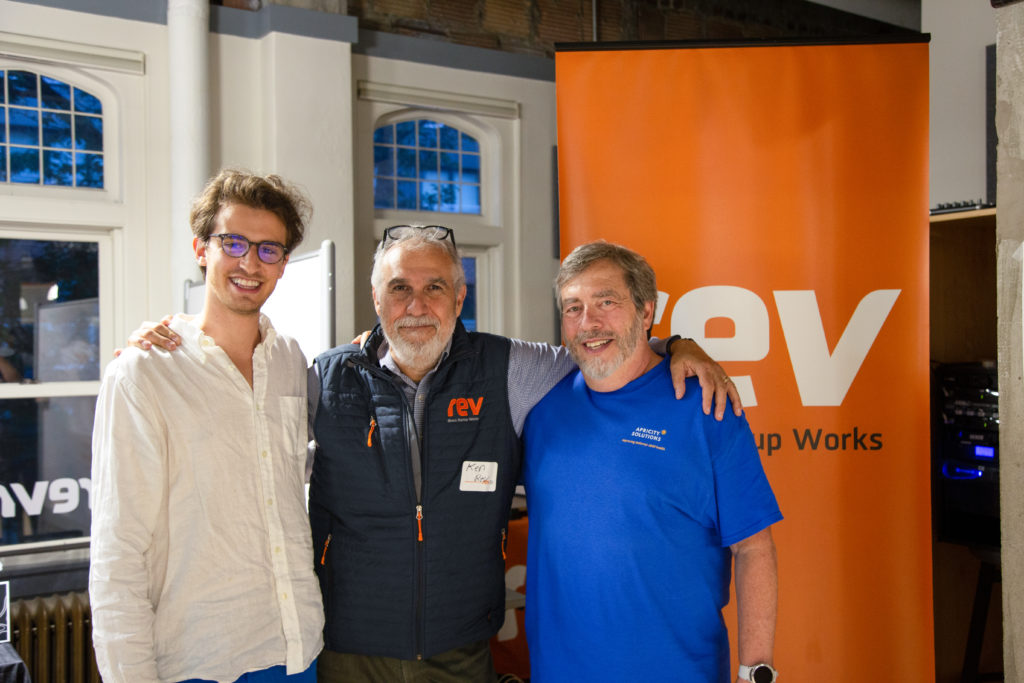
Before turning the microphone over to the founders to kick off the pitch portion of the evening, Putnam emphasized the importance of feedback for early-stage startups.
“I’m giving the audience a job: You are the first to see these technologies, and your first impression is going to be critical to whether these technologies can move forward or not,” said Putnam. “Having critical feedback is critical to success within entrepreneurship. Participants, you have a job: Put on your thick skin suits. Be able to take criticism and internalize it in a very positive way.”
Pitches from teams in the classic track included:
- InCase Technologies: Informed by his background in construction project management, founder Andrew Schwalm has designed a technology to improve safety on construction sites.
- BAS Technology: Founder Basil Alkahtani has devised a smart shaver to allow men to groom themselves using their smartphones.
- MODU: Inspired by her passions for fashion and sustainability, founder Jennifer Kahn has designed modularized clothing with detachable segments to create many outfit combinations using fewer pieces.
- Apricity Solutions: Founder Dr. Jeffrey Green, who enlisted the help of Cornell Engineering students Colin Erb and Jeffrey Shen, is addressing the issue of infant hypothermia with a safe and affordable infant warming blanket called Hugaroo.
- Arteria: To expand screening and monitoring for cardiovascular disease, founder L. Vaughn made a wearable device and digital platform for at-risk patients.
- CardioVigi: Founder Victoria DiStefano pitched her heart detection implant for catching heart damage early and notifying users, their families, and first responders in the case of a cardiac event.
A new addition this year, the AgTech track provides specialized training and connections to experts and potential partners in upstate New York’s robust food and agriculture ecosystem. Funded by the University Center program at the U.S. Economic Development Administration, the track also aims to prepare potential future applicants to the annual million-dollar Grow-NY food and agriculture business competition.
The following teams comprised the inaugural cohort of the AgTech track:
- Barn Owl Technologies: In response to the twofold issue of agricultural pests and pesticide overuse, founder Richard Chen came up with a pest tracking and warning system to help farmers spray less chemicals while still protecting their crops.
- Raw Butta: Founder Shevori Gene has formulated a high-quality, ethically sourced shea butter to improve upon the formula of existing shea products.
- Equilibrate: Co-founders Juan Boza and Michelle Greenfield have invented hoof sensors for early detection of equine lameness, a common health issue in horses.
- Smoke Taint No More: Founder Jen Neubauer’s temporary row cover protects grapes from damage caused by wildfire smoke. Currently, smoke taint causes billions of dollars in losses for the wine industry, and Smoke Taint No More’s technology will be the first preventative solution.
- Integrated Gardening Solutions: Ithaca High School students Julian Carreiro, Luke St. Pierre-Nguyen, Samuel Herman, and Finn Witherup founded IGS to provide an automated garden care solution for busy plant owners.
- MiFood Tech: Founder Mi Yan is confronting restaurant labor shortages by utilizing affordable robotics solutions.
Funded by the New York State Energy Research and Development Authority (NYSERDA), the ClimateTech track welcomed its second cohort this year. The track provides specialized additional workshops, resources, and connections with industry leaders to companies working to decarbonize the economy.
At Demo Day, the ClimateTech track featured:
- Wisely: Co-founders Rachelle McCray and Charles Driscoll have created a smart storage container for the farming sector to reduce food waste, a major producer of greenhouse gases.
- Jalavant: Co-founders Piyush Jain and Chendan Luo have invented a chemical analysis technology and software to efficiently recommend best practices to farmers.
- Project Chukku: In order to expand access to clean water, co-founders Kengo Yasue and Rohit Nayak have designed a technology that extracts water from the air.
- ReVert: Co-founders Ryan Li and Joe Lybik have developed the Teak Smart Cube, a power outlet that helps consumers save money on electric expenses and conserve energy.
- AgGen: Harnessing the power of insect decomposers, co-founders Amir Salehzadeh and Rosh Ho are upcycling waste into nutrition for pets, livestock, people, and other products.
After pitching their business ideas, participants continued to demonstrate how their prototypes worked to attendees. The startup founders also had the opportunity to meet potential collaborators as they networked over refreshments from Northstar Public House.
The next Networking@Rev event, Successful Student Startups, will recognize the impressive student founders who have taken advantage of Ithaca, NY’s supportive entrepreneurial ecosystem. Join Rev next month to catch pitches from standout student startup founders and to connect with others in the entrepreneurial ecosystem.
